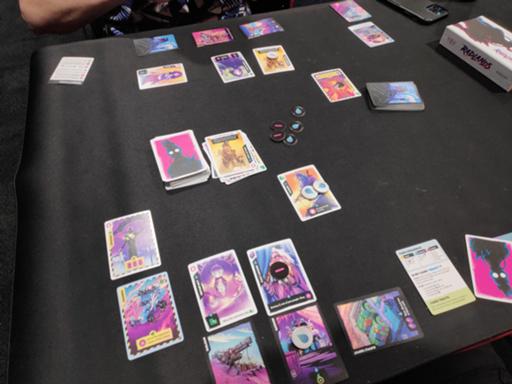Radlands is a
post-apocalyptic two-player duelling game from 2021. It's designed by
Daniel Piechnik, who has no other BGG credits.
You will have three camps, each of which provides one or more
abilities; if all three are destroyed, you lose the game. In front of
these you have two rows which you will fill with defenders. In a
standard game, you draw six camps and pick three; some are more
powerful than others, but each also lists a number of cards to draw
for your initial hand, so powerful camps will leave you with a smaller
selection.
The rest of the cards are broadly divided into people and events.
People go out in front of your camps; most attacks can only target the
card at the front of a row. Events go on a track to the side: most of
them have a delay of from one to three turns, and while it's not
usually possible to prevent them from happening, an opponent can try
to make some preparations.

A turn consists of resolving an event that's got to the front of the
queue, advancing any others, resetting to three water (the game's
currency), and then taking whatever actions one wants and can afford.
Actions are:
-
play a card, spending its water cost. This starts an event on the
track, or puts out a defender. Defender abilities can't be used on
the turn they're played, very Magic.
-
draw a card, paying two water for the privilege. There's no
automatic refilling of hands here.
-
discard a card, paying nothing, and getting whatever effect is in
its top left corner.
-
pick up the Water Silo special card: this costs one water and
provides one when junked, so it's effectively a way of saving one
water to use on a future turn.
-
use a card's ability: this often has a water cost.
Every card has two hit points: when it's damaged, it's turned sideways
and no longer gets its special ability. When it's damaged again, it's
removed.
The other special card that each player has one of is the Raid; this
pseudo-event will damage an enemy camp, but takes three Raid icons
(gained from card abilities or discards) to activate and propel it all
the way to the top of the event queue. (And while it's there, other
Events don't advance past it.)
The gameplay seems straightforward, but there are for my taste too
many spiky special cases to remember. The Raid is an event, but unlike
other events it doesn't advance automatically. Drawing a card costs 2
water. There are four separate things that can stop a card being
Ready, and one of them isn't shown on the table. Damage and
destruction effects can't be aimed at protected cards, i.e. those
which have another card in front of them, unless they include one of
the magic phrases "any", "all" or "one of". The game looks like a lane
battler, with your three camps lined up against the opponent's three,
but very few effects care about whether someone is in the same row as
the card that's producing them.
All this produces an ongoing friction and a continuing need to remind
myself of the rules: if I played this game all the time, doubtless I'd
overcome that, but for me the experience isn't enjoyable enough to
persist with it. My tactics are largely dictated by my initial card
draw; getting extra cards takes two-thirds of the resources I can
muster in a turn, so I don't do it often. The card art is boldly
coloured, which I've seen work very well, but the actual imagery (by a
variety of artists) is too often over-busy and unappealing.
And although the rules are strict about the layout of one's play area,
making it look like a lane battler, the lane each card is in is very
rarely of any importance.
So I can see how this could be a great game for the right players,
perhaps a local game group that duelled each other several times in a
session and got the rules thoroughly internalised, but as a player
with a large game collection it doesn't stand out enough for me to
want to make it one of my first-rank, play all the time, games—which
is the only way I'd come to enjoy it. This one leaves the collection,
I'm afraid; if I want a two-player confrontational game, I already
have Carlo Bortolini's lane battler
Riftforce also
from 2021, also with uninspiring art, but which manages to have fewer
special cases and more enjoyable gameplay; and Jon Perry's Air, Land
& Sea
from 2019, ditto.
(A review copy was provided.)
Comments on this post are now closed. If you have particular grounds for adding a late comment, comment on a more recent post quoting the URL of this one.